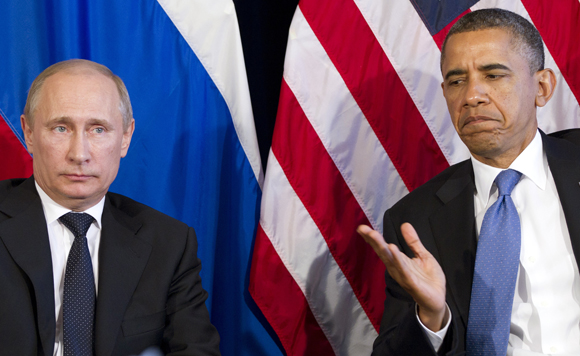Patrick Cockburn
London Independent
September 15, 2013

The agreement reached by Russia and the US yesterday calling for Syria’s arsenal of chemical weapons to be removed or destroyed, represents the first time that Russia has been so centrally important on the international stage since the last days of the Soviet Union, when Moscow was marginalised in the months between the Iraqi invasion of Kuwait in 1990 and the US-led counter-attack in early 1991. I remember sitting with the Soviet chargé in the Al Rashid Hotel in Baghdad as he agonised over the fate of the Soviet Union, which preoccupied him far more than developments in Iraq.
Russia’s status in Syria as a crucial ally of President Bashar al-Assad is uniquely favourable to the Kremlin. It does not mean that Russia can dream of emulating the influence and power of the old Soviet Union. But it does demonstrate that Russia’s long retreat as a world power is coming to an end.
Only two-and-a-half years ago, the US and Nato felt free to double-cross Moscow by using its naive assent to Western military intervention for limited humanitarian ends in Libya as if it was permission to overthrow Muammar Gaddafi.
For Russia, its Libyan debacle was the latest in a series of humiliations stretching back to the dissolution of the Soviet Union in December 1991. The US had assured the Kremlin that it would not expand its military alliances into Eastern Europe if Russian forces withdrew, but soon former members of the Warsaw Pact were joining Nato. In December 2001, President Bush withdrew the US from the Anti-Ballistic Missile Treaty which had been central to arms control for 30 years. Estonia, Latvia and Lithuania joined Nato.
What is different today is that the US is politically and militarily weaker than it was 10 years ago, because of its failure to win wars in Iraq and Afghanistan. The US position has been further undermined by a series of missteps in Syria, including the miscalculation that it would be as easy to get rid of Assad as Gaddafi. Washington and the West Europeans forgot that Gaddafi had only fallen because the Libyan rebels were backed by a full-scale Nato air campaign. Failing this, the Libyan rebels were never going to win on their own and the same is true in Syria.
 Daily Stormer The Most Censored Publication in History
Daily Stormer The Most Censored Publication in History


